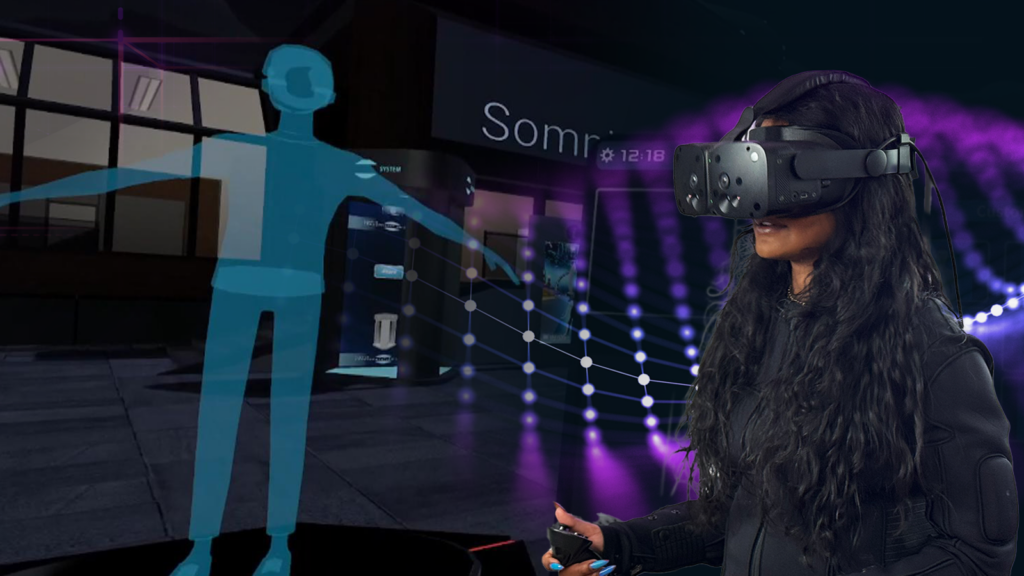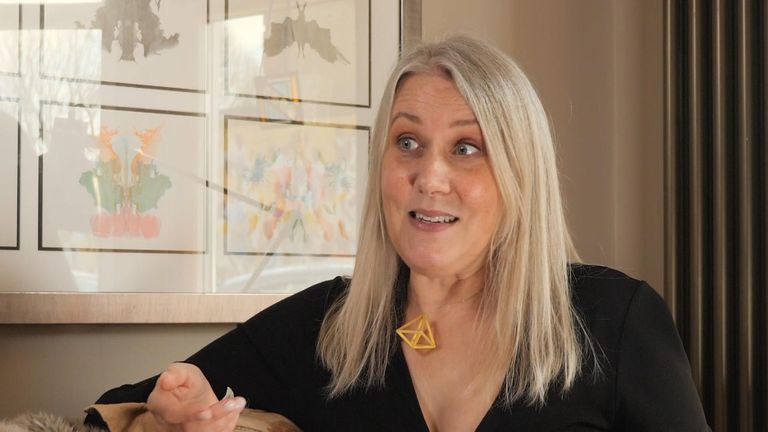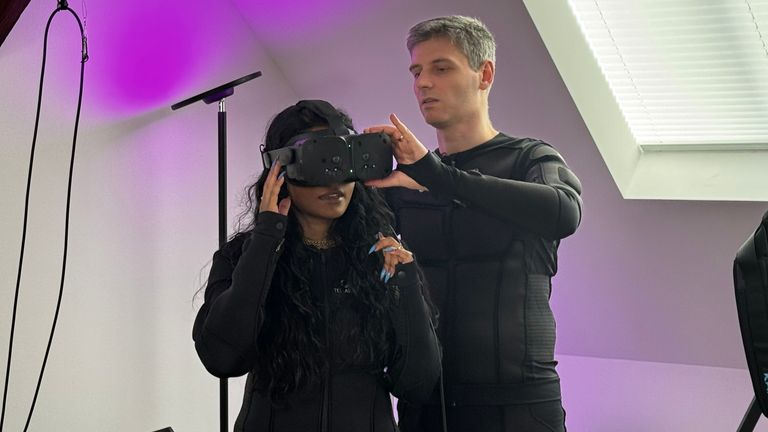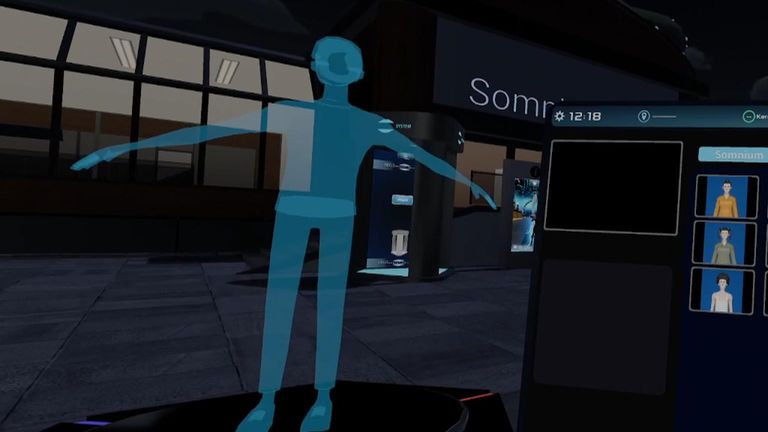‘We all want to live forever’: The tech letting people create avatars for loved ones to meet after they die | Science & Tech News

When technology entrepreneur Artur Sychov’s father was diagnosed with cancer, he was forced to accept a day may soon come when he wouldn’t be able to speak to him again.
The 38-year-old knew he would give anything to have another father-son conversation after his dad’s death.
So, using artificial intelligence, he got to work on a way that could make it happen for others in his position.
Artur has created a virtual reality tool called “live forever mode”. It features digital avatars who can simulate a person’s voice, mannerisms and movements after just 30 minutes of the user being observed.
The goal is for the avatar to live forever online as a memory of its creator so future generations of their family can interact with it.
Artur struggles to see any downsides to it.
“You can get to know the person,” he says. “You can hear their voice… You get to talk to them about different topics, and you get to inject a little bit of their personality.
“And with time, you’d actually be more and more precise. It would be more like them.”
Artur has created his own digital avatar
It is just one of the many ways in which companies across the world are reimagining our relationship with the dead – but there are concerns.
“It’s really pushing on that fundamental anxiety that we have about the end of our being,” says Elaine Kasket, a cyber psychologist and author.
“Some people have a lot of anxiety around that… I guess I have a few concerns about playing on those really existential fears as a means of selling your products.”

Elaine Kasket is a cyber psychologist
Artur’s company Somnium Space is trialling his “live forever mode” at its headquarters in Prague, Czech Republic, before its official launch.
Somnium Space is a 3D metaverse platform that users can access with a virtual reality headset. In this space, they exist as an avatar that can play games, create artwork, attend events and buy and sell virtual goods from other users.
It has already been downloaded 300,000 times since it was set up in 2017, and around 50 to 250 users log into the platform every day.
Artur uses the tool himself, with his avatar styled as a blue robot.
“You sound familiar,” Artur says, wearing a digital headset.
“I’m actually Artur,” his avatar responds.

Artur’s digital avatar
The real Artur poses a challenge: “You know I’m Artur. You’re not Artur. Who are you?”
The avatar mocks him: “I can see you’re trying to start a joke there. It seems like you might have got cut off. Want to finish the joke?”
When I try the technology myself, a user known as UltraLord “shakes” my avatar’s hand and greets me with a virtual hug. Despite not feeling a physical sensation, I feel hugged.

Artur Sychov shows Sky’s Arthi Nachiappan the technology
The idea of continuing your legacy is a driving force for some users.
UltraLord, who is based in Budapest, Hungary, says the concept of immortality is exciting.
“In a way, we all want to live forever in the things that we do, and we want the idea of us, the legacy of us to live on throughout our generations,” he says.
“So being able to actually create an idea of me that future generations can look back upon and kind of like, say and talk to and reflect on. It’s very exciting.”
He wants his avatar to outlive him so his future relatives can experience it.
He adds: “Instead of my kids having to hear stories of me and kind of make an idea of what they think I am in the past, they can actually talk to me and really know who I was, and that will give them a stronger sense of self.”
Read more:
Woman ‘chats’ to dead mother using AI – with ‘spooky’ results
I lost my job after AI tool assessed my body language
UltraLord is aware he is creating something he won’t be able to control after he has died, but he has made his peace with the idea.
“If it ever goes rogue, then I really don’t know what to do,” he says. “Well, I wouldn’t be able to do anything…”
The “live forever mode” tool is expected to officially launch later this year but there remain unanswered questions.
It will be paid for by a subscription fee, but what that fee will be is undecided, as is who will pay for it after the creator dies.
What is the metaverse?
The metaverse is an umbrella term for 3D immersive virtual worlds in which people can interact with each other and create a shared space.
Many users access these worlds with a virtual reality headset, but metaverse worlds are increasingly accessible on any device with an internet connection.
There are a number of different platforms including Fortnite, Roblox and Meta’s Horizon Worlds.
The total number of monthly active users across metaverse platforms reached 600 million by the end of 2023, according to figures published by Metaversed, the metaverse consultancy.
The same study found that the vast majority of metaverse users are children. Around 84% of users are aged under 18 and 51% of users aged 13 or younger.

The virtual tool allows users to create avatars of themselves that exist after they die
Users can buy and sell virtual goods in the metaverse, and their avatars can continue to do this after they die if they have signed up for the live forever mode. But it is up to users to make sure their family can access their accounts and benefit from their posthumous earnings.
Somnium Space says it does not keep any of the data used to train the avatar on its servers. It is all stored locally on the computers of its users across the world, and they can control how much or how little to store.
But what happens to personal data after you die is a point of contention.
This content is provided by Spreaker, which may be using cookies and other technologies.
To show you this content, we need your permission to use cookies.
You can use the buttons below to amend your preferences to enable Spreaker cookies or to allow those cookies just once.
You can change your settings at any time via the Privacy Options.
Unfortunately we have been unable to verify if you have consented to Spreaker cookies.
To view this content you can use the button below to allow Spreaker cookies for this session only.
Allow Cookies Once
👉 Listen above then tap here to follow the Sky News Daily wherever you get your podcasts 👈
In practical terms, if someone with malicious intent were to get hold of your information soon after your death, and before your family had a chance to decide what happens with your data online, you could be impersonated and your data manipulated, Ms Kasket warns, adding that you could even continue your former employment.
“If you’re a university lecturer, maybe that university will have you keep on lecturing,” she adds.
“Whether your family will see any money from that is open to question, because there’s no regulation around this.”
As technology evolves, we are looking at a future in which we can extend our legacies online and connect with dead loved ones in ways we didn’t previously think were possible.
But with that comes a warning: we also have to prepare for these practices to have far-reaching consequences on our legacies and on the real lives of our loved ones.

Recent Comments